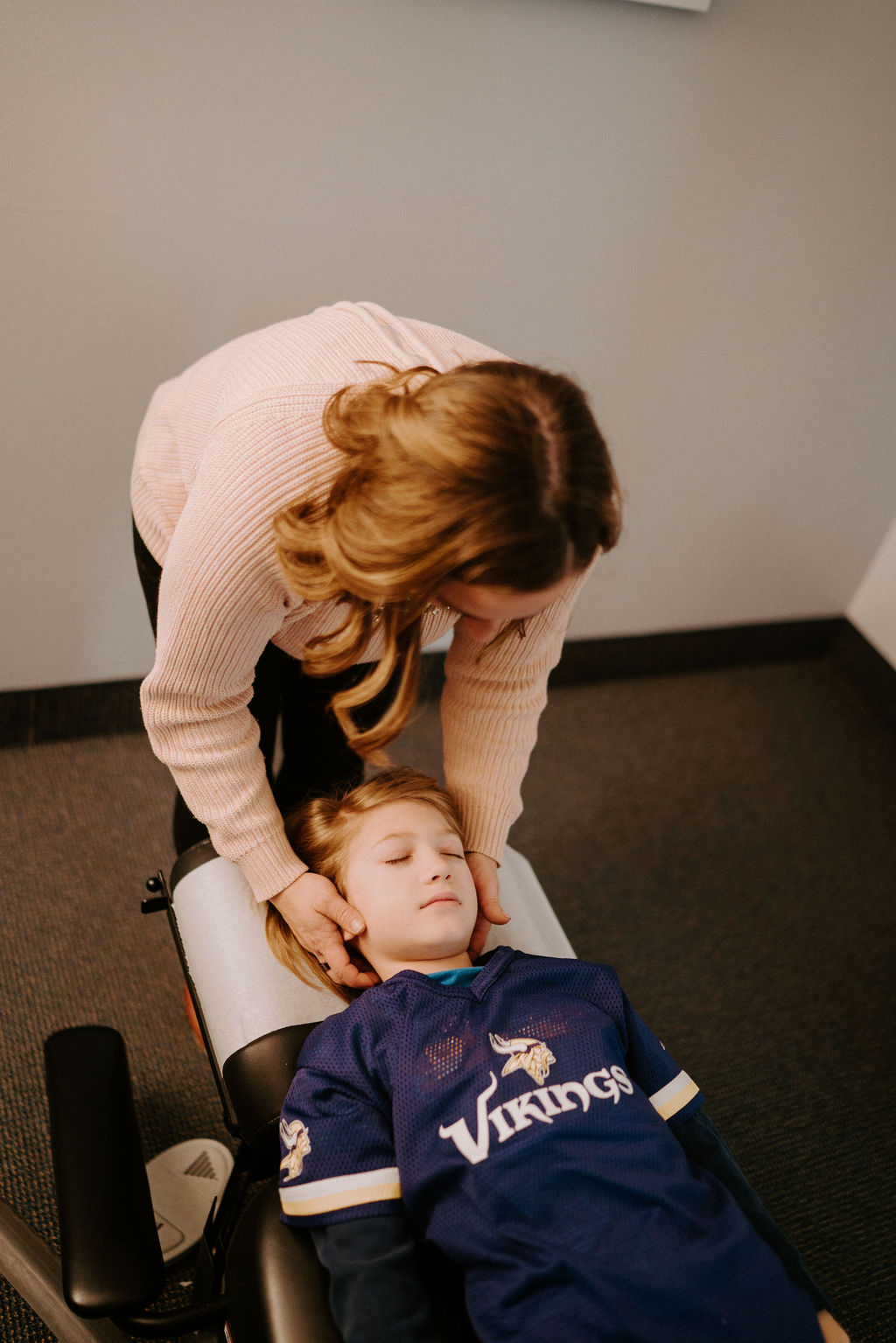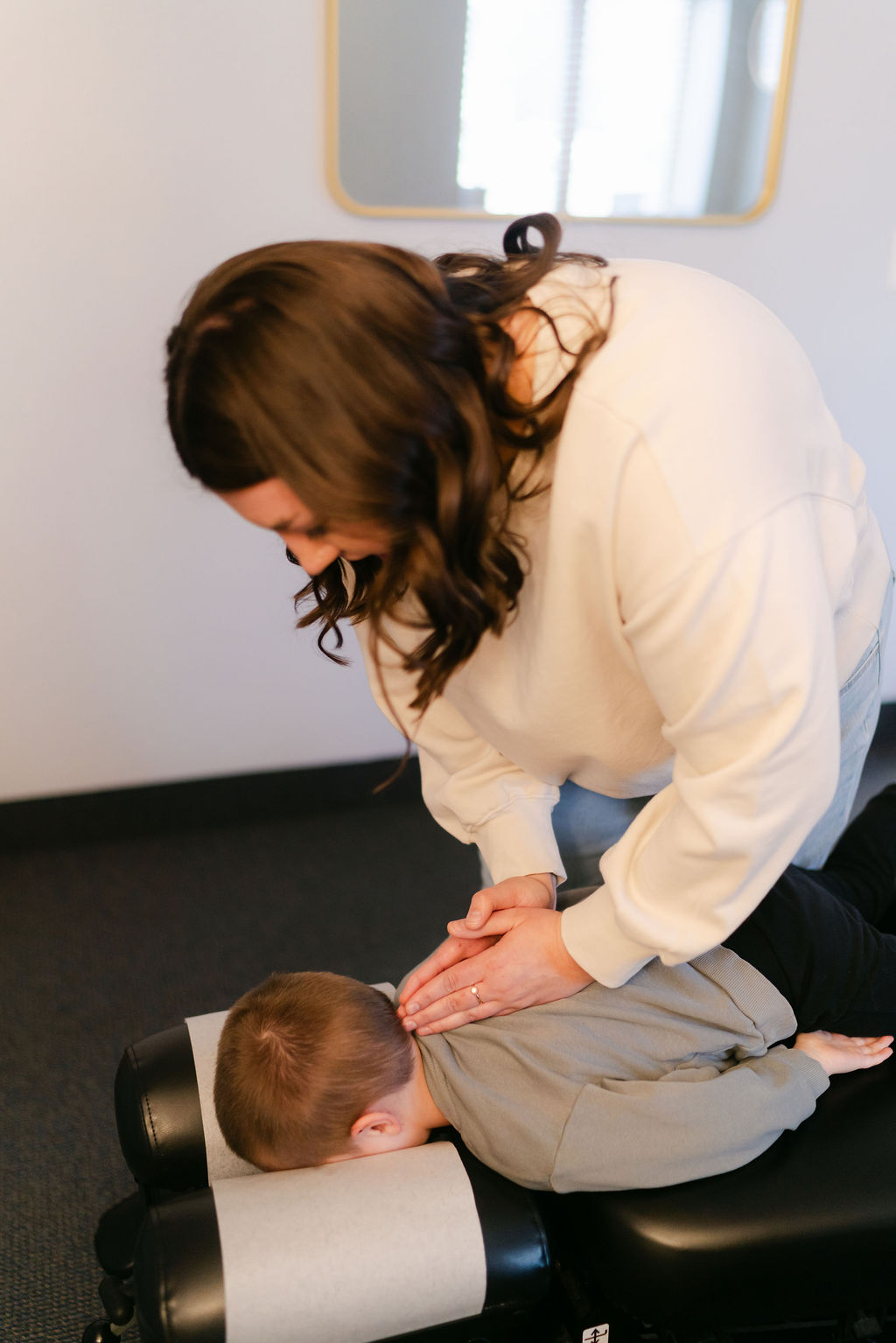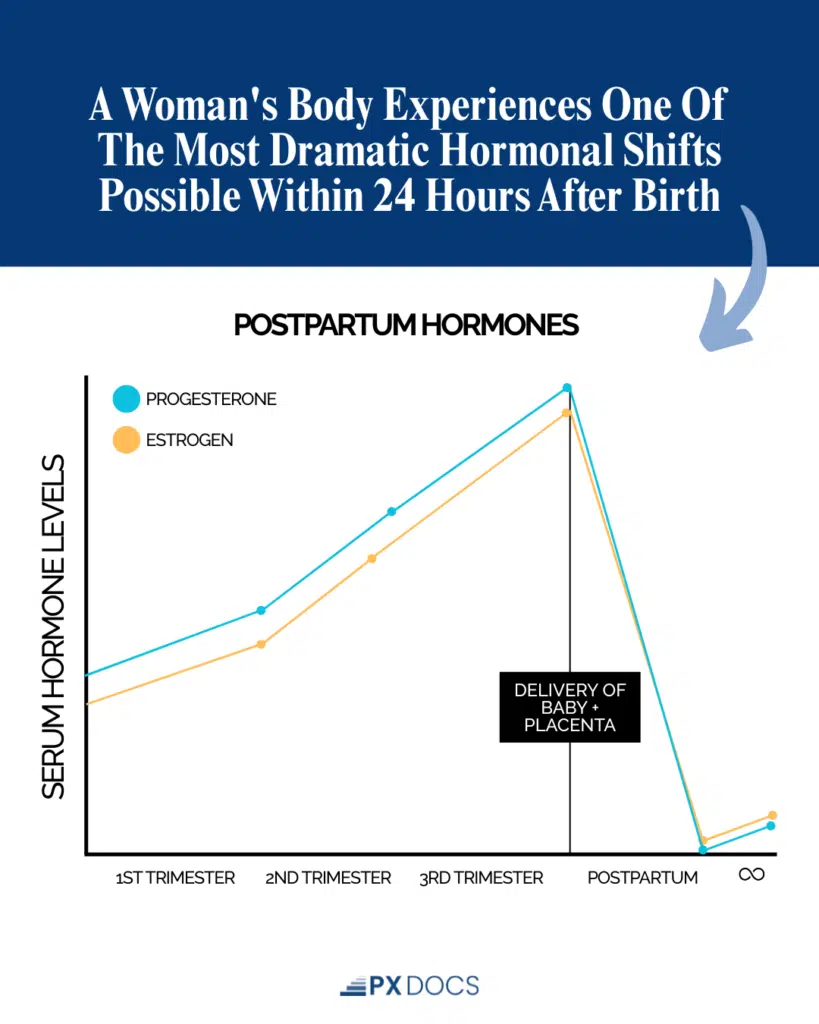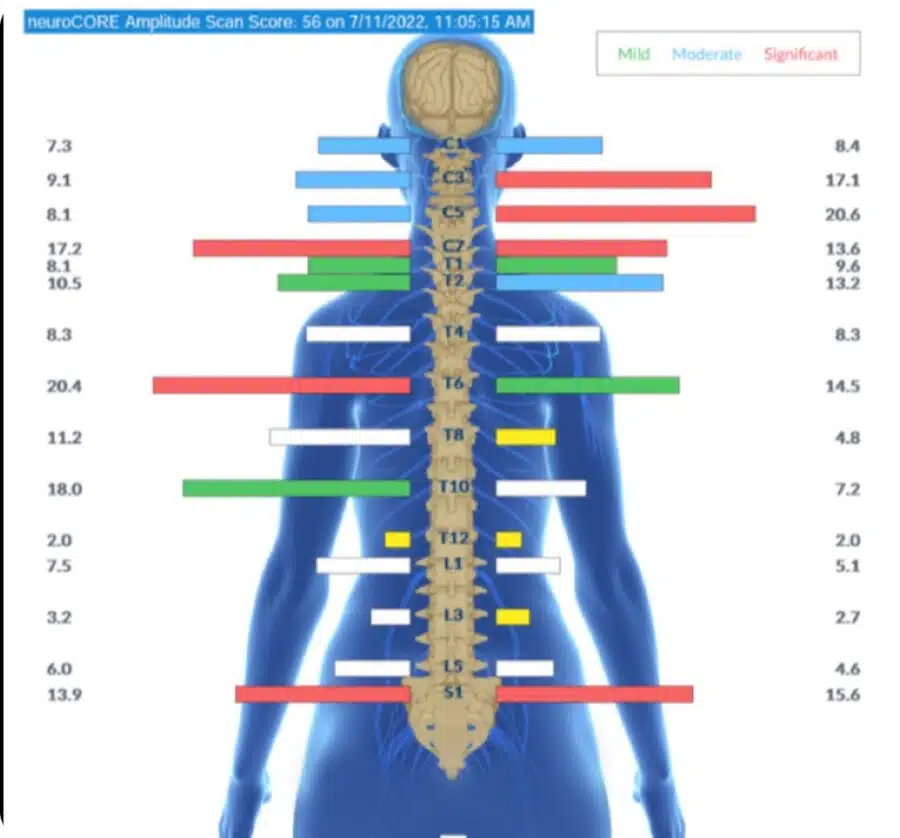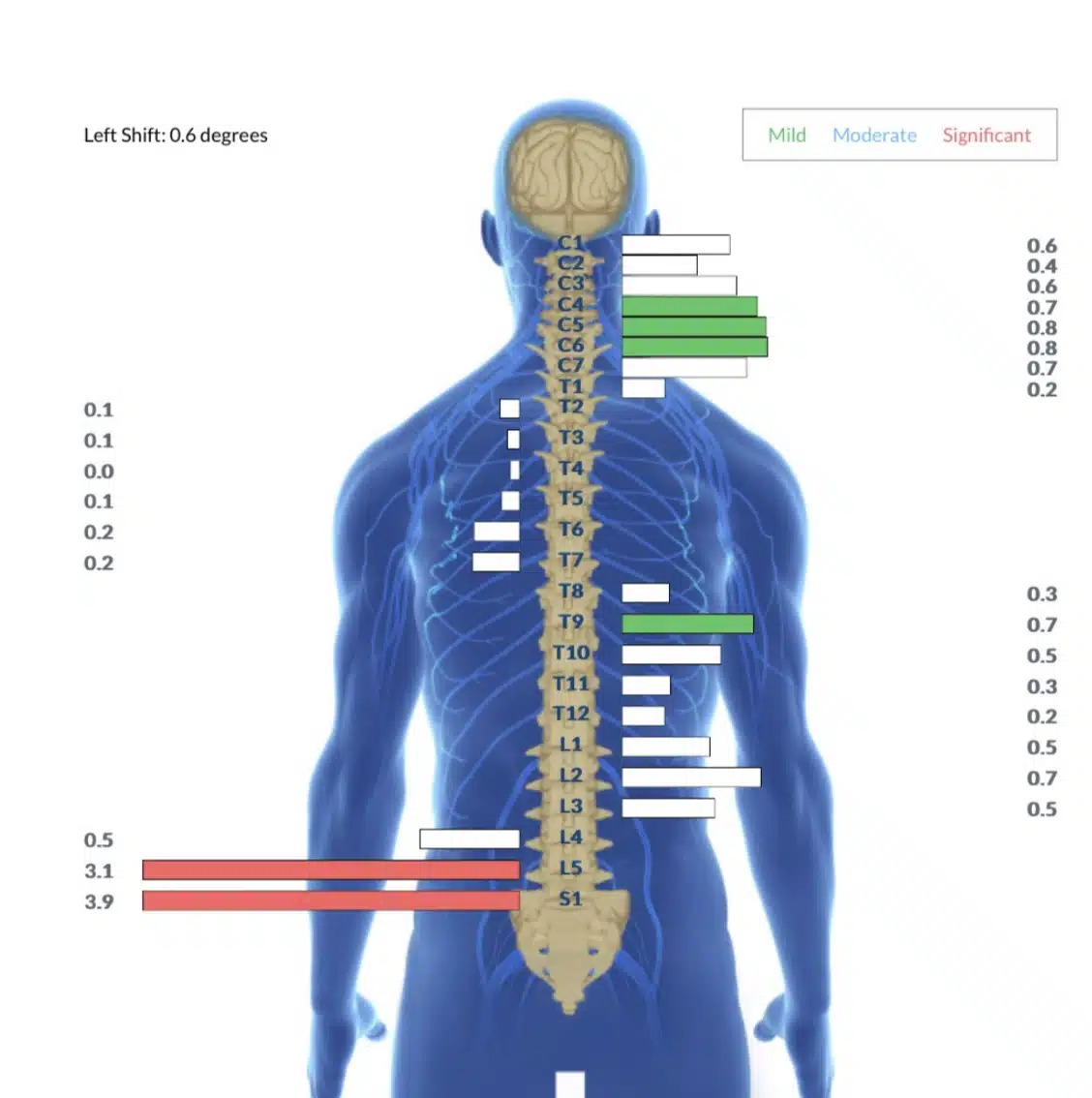WElcome TO
Explore our blog that focuses on holistic care for any and all ages - pediatric well-being, pre/post-natal health, and adult vitality.
THE BLOG

Dear Mama,
You’re doing everything right. The prenatal vitamins, every appointment, reading all the books, and preparing the nursery. But if you’re honest with yourself, you might realize you’re white-knuckling your way through pregnancy. Your shoulders are tight, your jaw is clenched, and no one seems to be addressing the stress you carry in your body every single day.
You deserve more than generic advice to “just relax.” You deserve to understand what’s really happening in your body — and your baby’s — and what you can do about it.
Two Very Different Birth Stories
Let us paint two pictures for you.
Birth Story #1: Mom arrives at the hospital already exhausted from weeks of poor sleep and chronic stress. Labor isn’t progressing “fast enough,” so Pitocin is started. The contractions become overwhelming. An epidural is placed. Hours pass. The baby’s heart rate dips. Suddenly, there’s urgency in the room. Vacuum extraction. Maybe a c-section. Baby is whisked away for evaluation. When they’re finally reunited, baby struggles to latch. The crying won’t stop. Everyone’s nervous system is screaming.
Birth Story #2: Mom has spent her pregnancy learning to regulate her nervous system. She arrives at the birth center breathing deeply, moving intuitively. Her body knows what to do. Labor progresses steadily. She flows between rest and active pushing. Baby emerges alert and calm, immediately placed on her chest. Within minutes, baby finds the breast. The room is quiet except for soft coos. Everyone’s nervous system is singing the same serene song.
What’s the difference? It’s not just the birth setting or the provider, though those matter. The foundational difference is the state of mom and baby’s nervous system.
Your Nervous System Is Running the Show
Think of your nervous system as the air traffic controller for your entire body. It’s coordinating your heartbeat, digestion, sleep patterns, immune response, and stress reactions — all without you consciously thinking about it.
Your autonomic nervous system has two main branches:
The Sympathetic System (Your Gas Pedal): This activates when you need to respond to something — a deadline, a perceived threat, or even exciting news. It increases your heart rate, diverts blood to your muscles, and sharpens your focus.
The Parasympathetic System (Your Brake Pedal): This helps you rest, digest, recover, and connect. It slows your heart rate, promotes healing, and allows your body to do its maintenance work.
In an ideal world, you press the gas when needed and the brake when needed, flowing smoothly between the two. But chronic stress — the kind so many pregnant moms experience — causes these systems to get stuck. You might be riding the gas pedal 24/7, or you might have a brake pedal that won’t fully engage. Either way, you’ve lost the ability to flow.
Your Baby Is Learning From You Right Now
Here’s what most prenatal care doesn’t tell you: your baby’s developing nervous system is being shaped by yours. Every moment.
When you’re chronically stressed, your body releases cortisol and adrenaline. These hormones cross the placenta. Your baby’s brain — which is developing at an astounding rate — is bathing in these stress chemicals. This isn’t about making you feel guilty; it’s about giving you power. Because when you understand this, you can do something about it.
Your nervous system is literally your baby’s first teacher. Before they take their first breath, before they hear their first lullaby, they’re learning regulation from you. Are they learning that the world is safe or dangerous? That their body can rest or must always be on alert?
Birth Isn’t Just Physical — It’s a Nervous System Event
Here’s something most people don’t understand about birth: it actually begins in a parasympathetic-dominant state. That’s right — your brake pedal needs to be engaged.
Oxytocin, the hormone that starts and sustains labor contractions, is released most effectively when you feel safe and calm. This is why dim lighting, quiet spaces, and supportive people matter so much. Your body won’t fully release oxytocin when it’s in fight-or-flight mode.
As labor progresses into the pushing phase, your nervous system must shift to sympathetic activation — but only at the right time and in the right way. This is the flow we talked about earlier. Gas and brake, working together in perfect rhythm.
But when mom enters birth already stuck in stress mode — or can’t flow between these states — the entire sequence gets disrupted. Research consistently shows that mothers who feel safe during birth experience shorter labor, increased oxytocin release, and lower pain levels. This isn’t just about comfort; it’s about physiology.
And after birth? Your baby’s first regulation comes through co-regulation with you. Skin-to-skin contact, eye contact, the rhythm of your heartbeat against theirs — these aren’t just sweet bonding moments. They’re your baby’s nervous system, learning how to regulate by syncing with yours.
If your nervous system is dysregulated, it’s harder to establish that co-regulatory loop. This can affect everything from breastfeeding to sleep patterns to your baby’s ability to be soothed.
The Missing Piece of Prenatal Care
Standard prenatal care is essential. Your provider monitors your baby’s growth, screens for complications, checks your blood pressure, and tracks development. All crucial work.
But there’s usually no assessment of your nervous system function. You might get told to “reduce stress” without any objective way to measure whether your system is actually regulated or stuck in survival mode.
This is where Neurologically-Focused Chiropractic Care comes in, which is what we do at RCW. Through advanced technology like INSiGHT Scans — including thermal imaging, surface EMG, and Heart Rate Variability testing — we can measure how your nervous system is functioning.
These aren’t subjective assessments. They’re objective data showing us:
- Whether your sympathetic and parasympathetic systems are balanced
- Where tension and stress are being held in your body
- How well your nervous system adapts to stress
- Whether you’re stuck in fight-or-flight or able to access rest-and-digest
Then, through gentle, specific chiropractic adjustments, we work to restore balance. We’re not treating symptoms; we’re helping your nervous system remember how to flow between gas and brake. And when your nervous system learns regulation, your baby’s developing system learns it too.
When Should You Start?
The honest answer? Earlier in pregnancy is better. The more time we have to work with your nervous system before birth, the more deeply we can support regulation for both you and your baby.
But it’s never too late to start. We’ve seen profound changes happen in the third trimester, even in the final weeks before birth. Your nervous system has an incredible capacity for healing and adaptation when given the proper support.
What You Can Control
You can’t control every variable of pregnancy and birth. Sometimes life-saving interventions are needed, and we are deeply grateful for modern medicine when those moments arise.
But even when interventions are necessary, we need our nervous system to know what to do. A regulated nervous system helps you recover faster, bond more easily, and navigate postpartum with more resilience.
Before birth comes, you can choose to support the one system that influences everything else: your nervous system. You can choose to give your baby the gift of learning regulation in the womb. You can choose to prepare your body not just physically, but neurologically.
Your Next Step
You could do all the traditional preparation — the miles circuit, raspberry leaf tea, eating dates, and practicing birth positions. And those things are wonderful.
But if we could give you only one tip for preparing for birth, it would be this: nervous system repair and regulation.
Your baby’s nervous system is being shaped right now, in this moment. Every day of your pregnancy is an opportunity to teach them regulation, safety, and calm.
If you’re ready to get real answers about your nervous system function — not just reassurance that “everything looks fine” — we’d love to help. Please reach out to RCW today to schedule a consultation.
Our Neurological INSiGHT Scans will show you exactly what’s happening in your nervous system. And our care will help you restore the balance and flow you need for the birth you deserve.

Before investing in another ashwagandha supplement, booking a wellness retreat to Sedona, or purchasing an infrared sauna for your home, there’s something crucial you need to understand about your family’s nervous system.
The conversation around nervous system “regulation” has exploded recently, and that’s genuinely wonderful news. Providers, parents, and experts everywhere are finally talking about ways to support and “hack” your nervous system. But here’s what most people don’t realize: like most hacks, these approaches only scratch the surface. They rarely dive deep enough to truly HEAL and REPAIR the nervous systems of the families who need help most desperately.
Please don’t misunderstand. We’re huge advocates of nervous system regulation practices, functional medicine, targeted supplementation, detox protocols, diet modifications, and thoughtful fitness programs. These approaches have tremendous value. But here’s what we hear from parents almost daily: “I’ve tried everything, and none of it seems to be working.”
The brain fog persists. The anxiety remains. The exhaustion won’t lift. And for your children, the sleep struggles continue, sensory challenges intensify, and behavioral issues seem stuck in an endless, frustrating loop.
The Truth Most Parents Haven’t Heard
Here’s what most parents and even many healthcare providers don’t yet realize: you can’t regulate a nervous system that needs to be repaired first.
Until we address the foundational problems at their root, everything else becomes just another surface-level band-aid that eventually peels off without delivering lasting results.
You’re Not Alone in This Struggle
Let’s look at some eye-opening statistics. Depending on which research you examine, between 60 to 75% of US adults are living with at least one chronic illness. The numbers for children aren’t much better, with 40% to over 50% facing chronic health challenges according to various studies.
Whether we’re discussing chronic digestive issues, autoimmune conditions, or neurodevelopmental challenges like autism, the rates of nearly every condition have exploded in just a couple of generations.
This means we can’t simply blame genetics or attribute it to better diagnostic tools. Instead, we must acknowledge the real culprit: a chronically stressful, chaotic, toxic, and overmedicalized environment and lifestyle that’s impacting our families from day one.
We witness this pattern every single week in clinical practice. Parents arrive after trying everything imaginable. They’ve consulted multiple specialists. They’ve invested thousands in every therapy, protocol, and program available. They see temporary improvements—maybe a few good weeks—but then everything resets. The anxiety returns. The digestive issues flare up again. The developmental progress stalls.
It’s not that these approaches don’t work. The problem simply runs deeper than surface-level interventions can reach.
Understanding the Critical Difference: Repair vs. Regulation
Nervous System Repair
Nervous system repair addresses the actual dysfunction within the nervous system itself. The interference and disruption caused by past trauma and accumulated stress that leads to something called subluxation and nervous system dysfunction.
Think of it like repairing faulty wiring in your home’s electrical system. No matter how many high-end appliances, 4K TVs, or premium sound systems you try to plug in to make your house more awesome, they’ll just overload the system further until everything breaks down. The problem isn’t with the equipment you’re trying to add. It’s with the foundational power supply that needs to be repaired.
Nervous System Regulation
Nervous system regulation includes practices that help an already-intact nervous system shift into calmer, more balanced states. This encompasses breathing exercises, yoga, meditation, cold therapy, supplements, and various wellness practices.
The Critical Distinction
Here’s what you need to remember: repair is fixing the engine; regulation is learning how to drive it smoothly. You can take all the driving lessons in the world, but if the engine itself is broken, you’re not going anywhere.
The Body Keeps the Score—And It’s Stored Deeper Than You Think
According to the groundbreaking book “The Body Keeps the Score,” trauma isn’t just processed and filed away in our minds. It’s stored in the actual tissues, structures, and nervous system of the body, often far below our conscious awareness.
This entire system is known as the Somatic or NeuroSpinal System. This is why you feel all sorts of stress. Whether from physical exertion, environmental toxins and chemicals, or long, stressful, and emotional days. The stress fully lodges in your neck, between your shoulder blades, in your low back, and other parts of your body.
When your body encounters overwhelming stress or trauma, it goes into protection mode. This response is brilliant for survival in the moment, but that protective state can become locked in, creating patterns of dysfunction that persist long after the initial threat has passed.
Here’s the uncomfortable truth: you simply can’t talk your way out of trauma that’s stored in your neurospinal system, brainstem, and vagus nerve. Similarly, you can’t breathe away physical subluxation patterns that have been locked into your nervous system since birth trauma or early childhood stress.
There’s a fundamental principle in neuroscience that every parent should understand: you can’t be in growth and protection at the same time. When your nervous system is stuck in that sympathetic-dominant, survival-oriented state, all the meditation and supplements in the world won’t create the lasting change you’re desperately seeking.
The Perfect Storm That Requires Deep Repair
While we all know modern life is incredibly stressful for us as adults. What most parents and providers don’t yet realize is how early the stress, toxicity, and medicalization of our current lifestyle begins. Even for our children. We call this “The Perfect Storm”.
Most children today experience a series of stressors that create cascading neurological dysfunction:
Prenatal Stress: When mothers experience high anxiety or take certain medications during pregnancy, it affects the developing nervous system of their baby.
Birth Interventions: C-sections (now occurring in 1 in 3 births), forceps delivery, vacuum extraction, or induction place profound physical strain on an infant’s delicate brainstem and upper neck.
Early Childhood Stressors: Colic, reflux, and constipation aren’t just normal infant struggles. They’re early warning signs of nervous system dysfunction that too often get dismissed or only treated symptomatically.
The Antibiotic Cascade: When these issues lead to frequent ear infections and repeated rounds of antibiotics, the damage deepens. Research shows that repeated antibiotic use in children under age 2 significantly increases their likelihood of struggling with allergies, asthma, and gut issues later in life.
The level of stress and trauma most children experience locks the neurospinal system into such a deeply stuck state that surface-level interventions simply can’t penetrate through to create meaningful change. It’s not that other approaches are wrong—the dysfunction is just too severe and too deeply embedded for them to address on their own.
Why Your Regulation Tools Keep Failing
When subluxation creates constant interference in the system, and the vagus nerve is dysfunctional due to early trauma, regulation tools are like trying to change the thermostat when the furnace itself is broken.
What are the clinical signs that repair must come first?
- Therapies and interventions don’t stick or provide lasting results
- Gut health protocols work temporarily, then plateau
- Constant relapses after periods of improvement
- High reactivity to small triggers
- Quickly resetting back to a stressed state, even after calming activities
What Changes When the System Is Repaired?
Once the system is repaired and in a “ready state,” something remarkable happens:
- Breathwork becomes significantly more effective
- Supplements are better absorbed and utilized by the body
- Dietary changes create more significant, lasting impacts
- The body’s innate healing capacity can finally activate and do what it was designed to do
Your Family Deserves More Than Surface-Level Solutions
At RCW, we understand that nervous system repair opens the door for all those regulation tools to finally work as intended. Your family doesn’t need more health hacks or another stack of supplements. You need the right foundation.
We practice specialized Neurologically-Focused Chiropractic Care and can measure and restore nervous system function using advanced scanning technology and gentle, effective adjustments. This approach helps release years of built-up stress and tension so your child’s body—or your own—can finally shift from protection mode to healing mode.
So, if you’re exhausted from trying intervention after intervention without lasting results, please reach out to RCW today!
Your family’s healing journey doesn’t have to feel this hard. Sometimes, you just need to start at the right place—the foundation.

Picture this: It’s Thanksgiving dinner. Your kids are having complete meltdowns, grandma’s anxiety is through the roof, dad’s jaw is clenched from work stress, and you’re trying to hold everything together while your eye won’t stop twitching. Sound familiar?
Here’s what you need to know: This isn’t just holiday chaos—this is your family’s nervous systems playing tug-of-war with each other.
The Truth About Stress No One’s Talking About
Stress is contagious. And I don’t mean that metaphorically—I mean neurologically, scientifically, measurably contagious.
When one family member’s nervous system gets stuck in fight-or-flight mode, it creates a ripple effect that impacts everyone in the house. Your baby picks up on dad’s work tension. Your toddler mirrors your overwhelm. Even the dog starts acting differently when the family stress peaks.
We keep trying to fix individual problems—anxiety medication for mom, sleep training for baby, behavior charts for the five-year-old. But we’re missing the bigger picture. You can’t heal in isolation when you’re neurologically wired to co-regulate with the people you live with.
What the Research Really Shows
Research reveals that up to 15% of infants experience regulation difficulties in their first year. However, what that statistic doesn’t capture is that those babies are usually born into families where their parents are already dysregulated.
The data gets even more compelling. When mothers experience chronic stress during pregnancy, their cortisol levels can directly program their baby’s developing nervous system. That baby grows up with a nervous system pre-wired for stress. They become anxious kids, then stressed adults, who have babies of their own.
The cycle continues.
During the holidays, when three or four generations gather, you’re not just sharing turkey—you’re sharing nervous system patterns that have been passed down like family recipes.
Understanding Co-Regulation: Your Family’s Invisible Connection
Your nervous system doesn’t operate in isolation. It constantly reads and responds to the nervous systems around you through a process called co-regulation.
Think of it like this: just as an air traffic controller coordinates multiple planes, your nervous system is trying to coordinate with every other nervous system in your home.
Kids are especially tuned into their parents’ nervous system states. They detect stress through your tone, your touch, and even your heartbeat from across the room. When dad comes home stressed from work, the entire family’s nervous systems shift toward sympathetic dominance—fight or flight mode—within minutes.
Studies using Heart Rate Variability (HRV) measurements show that the stress patterns of family members often synchronize, creating either a cycle of calm or a storm of chaos.
Why Treating Just One Person Doesn’t Work
Here’s the hard truth: caring for your anxiety while your partner stays dysregulated is like trying to remodel a house on a cracked foundation. You’re building on an unstable base.
Sending your child to therapy while the home environment stays stressed? That’s like pushing a car with the parking brake on. Progress will be slow and frustrating.
The “Perfect Storm” isn’t individual—it’s environmental, generational, and collective, affecting everyone under the same roof.
When one family member gets adjusted or receives care while everyone else remains dysregulated, it’s like having one instrument tuned in an orchestra where every other instrument is off-key. The discord remains.
The Holiday Amplifier Effect
Ever wonder why family gatherings feel so exhausting? It’s not just the cooking and cleaning.
Holiday gatherings amplify nervous system dysregulation because multiple stressed systems converge in one space. Grandparents bring their lifetime of patterns, you bring work stress and parenting overwhelm, and your kids absorb it all—creating a perfect storm of nervous system chaos.
This explains:
- Why kids “act out” more during holidays
- Why you feel completely drained after family time
- Why everyone seems to get sick after big gatherings
It’s not the tryptophan making you tired—it’s nervous system overload from trying to regulate with multiple dysregulated people. Your nervous system can only handle so much input before it trips like an overloaded circuit breaker, leaving everyone feeling fried.
The Path Forward: Healing Together
Here’s the empowering truth: when you understand how your family’s nervous systems are connected, you can actually do something about it.
When families receive neurologically-focused care together, their HRV patterns begin to synchronize in healthy, balanced ways. You create what we call a “regulation field” where everyone’s nervous system supports rather than stresses the others. Just like that umbilical cord that connected you and your baby, your family stays neurologically connected—and healing happens best when you heal together.
What You Can Do Right Now
Start by acknowledging the connections. Notice how your stress shows up in your kids. Pay attention to how one person’s bad day affects the mood of everyone else. You’re not imagining it—these patterns are neurologically real.
When you prioritize whole-family nervous system support, you’re not just helping your child with their sleep issues or anxiety. You’re rewiring your entire family’s capacity for calm, connection, and resilience. You’re breaking generational patterns and giving your children a different neurological foundation than you inherited.
Your family deserves better than survival mode. So don’t wait to reach out to Rochester Chiropractic and Wellness today to schedule a consultation!
Now that you understand how deeply you’re all connected, you can take charge and create real, lasting change—together.

